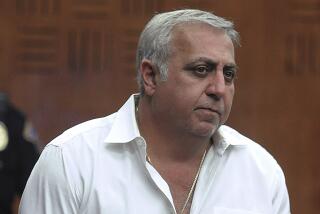Israeli Party Payments Key Focus : Meese’s Differing Versions of Pipeline Role Reported
- Share via
WASHINGTON — Atty. Gen. Edwin Meese III gave differing recollections of his knowledge about possibly illegal payments to the Israeli Labor Party in connection with an Iraqi oil pipeline project, the New York Times, which obtained portions of a sealed report on Meese’s activities, said in today’s editions.
The report by independent counsel James C. McKay shows that Meese was asked in November, 1987, by the prosecutor whether he understood when he received a memorandum from longtime friend E. Robert Wallach about the $1-billion proposed pipeline that a portion of the project funds would go to the Israeli Labor Party.
Meese said “that certainly would be consistent with my understanding.” However, two months later, Meese submitted a clarification of his testimony, saying he did not recall that part of the memo. The clarification came a few weeks after news accounts reported that the memo from Wallach to Meese mentioned planned payments to the Labor Party, constituting a possible violation of the Foreign Corrupt Practices Act.
Meese’s lawyers, Nathan Lewin and James Rocap, told the newspaper that Meese had been consistent in his statements about his knowledge of the plan to make payments to the Labor Party. Lewin said Meese does not recall reading the portion of the memo dealing with payments to the political party and that that is what Meese meant to say when he gave the statement to McKay in November, 1987.
McKay concluded that the memo was the only direct evidence of a bribery plan and that, therefore, the available evidence is insufficient to conclude that Meese’s activities on behalf of the pipeline violated the corrupt practices act.
McKay said a sensitive Justice Department memo to Meese about the pipeline was missing from Meese’s files. Meese had testified he had received the memo and might have shared it with Wallach, the report said. The memo dealt with a financial option pertaining to possible U.S. backing for the financial and security guarantees for the pipeline, according to the report.
McKay also found that Meese was “closely involved” in 1985 in discussions about building the pipeline. He said the project was of limited interest to the U.S. government until Meese made a “highly unusual” phone call to the White House in 1985 at Wallach’s request. Wallach was representing one of the project’s partners, Swiss oilman Bruce Rappaport. Meese repeatedly has characterized his involvement in the project as limited.
According to the newspaper, the report also says that McKay found that Meese and his staff at the White House in the first years of the Reagan Administration were “instrumental” in persuading the Army to change positions and agree to give Wedtech, a South Bronx, N.Y., defense contractor, a $32-million no-bid contract to build small engines.
But McKay’s report said he had determined that available evidence does not show any criminal wrongdoing by Meese in regard to Wedtech.
The report also found insufficient evidence to show that Meese received any improper benefit from Wallach or from investment manager W. Franklyn Chinn, to whom Meese was referred by Wallach. Chinn turned a $40,000 profit for Meese on a $50,000 investment in just 18 months by obtaining hard-to-get brand-new stock issues and selling them the same day, usually at a substantial profit.
McKay’s report has been referred to the Justice Department office of Solicitor General Charles Fried, the first step in what is expected to be a review of Meese’s ethical conduct by the Office of Professional Responsibility.
More to Read
Get the L.A. Times Politics newsletter
Deeply reported insights into legislation, politics and policy from Sacramento, Washington and beyond. In your inbox twice per week.
You may occasionally receive promotional content from the Los Angeles Times.










